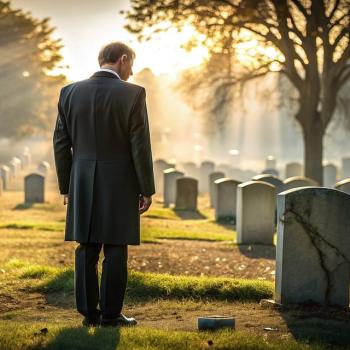Many people who left the Church are NOT coming back.
I wrote about why people are leaving the Catholic Church here. Typically, I post the link to my Patheos columns in various Facebook groups. And I heard from a number of ex-Catholics on whether the Church can reverse the decline. The short answer is “No.”
Some readers note that these lessons apply to Protestant churches, too. The Southern Baptist Convention lost 250,000 members last year.
Readers cite a few reasons why it will be difficult to reverse the decline in church attendance:

Cultural Challenges
Often, I say that all religion is cultural. Some religions, such as Hinduism and Judaism, are ethnic identities, as well as religious identities. Many religions, such as Islam, Shinto, and Tibetan Buddhism, often retain their native languages when practiced in foreign countries.
Christianity is thought of as a global religion, but it largely spread through colonialism and the Doctrine of Discovery, so it is popular in former colonies in Africa, Australia, North America and South America, but it is NOT popular in uncolonized areas in Asia and elsewhere.
One reader wrote, “I sympathize with the challenge of maintaining a Catholic identity across dozens of global cultures and a billion and a half individuals, each with their own unique temperaments.” It can be difficult to maintain unity amidst diversity.
Will the Church reform so that liberal ex-Catholics (in Europe, for instance) will come back to the Church? If the Church reforms that way, will conservative Catholics (in Africa, for instance) leave the Church? In the future, can these different camps continue to co-exist?
Demographic Challenges
Some of the readers who responded to my last column were older ex-Catholics. And, some of them were younger soon-to-be ex-Catholics. Young people are generally less religious and more secular. At the same time, they often describe themselves as spiritual, but not religious.
Some readers noted that the video by Tom Wadsworth that I referenced last week mentioned the demographic challenges of aging members. Wadsworth reports that, on average, over half of church attendees in the Catholic and Protestant churches that he studied were 65 or older.
Wadsworth, a former pastor, listed some of the practical challenges of older church attendees. Can an old church attract young members? Can a small, declining church with a largely older membership afford to provide ministries such as babysitting or youth ministries?
Many of us have lived through the death (or terminal illness) of a church, and we have struggled with how to attract new (young) members. For young people, the Church’s positions on abortion, birth control, LGBTQ+ people, married priests, and women priests are non-starters.
Despite some claims that the decline in church attendance is slowing, the demographic challenges suggest that the decline is inevitable.
Doctrinal Challenges
In The Way, I described James Fowler’s stages of faith development. Fowler explains that many people evolve from a faith that values authority, conformity and literalism to a faith that values paradox, social justice and universality. My path followed this trajectory.
As people become exposed to different traditions, they will demand more tolerance from their own traditions. I have NOT heard anyone say, “Now that I understand other religious traditions, I am so much more certain that my tradition is right and that all others are wrong.”
As I suggested in The Way, if we explore the roots of our own traditions, we discover that our doctrine is NOT as absolute, authentic, original, unchanging, or universal as we might have assumed. Religions are like languages, different ways of describing the same indescribable Reality.
Some Christians, especially conservative Catholics and Evangelical Protestants, continue to value authority, conformity and literalism. Often, this types of faith emphasizes orthodoxy or right belief, rather than orthopraxy or right action.
One reader wrote, “I hope the church can become more like my family. Some of us are still Catholics, others (like myself and my mom) aren’t. We still love and support each other despite our different faiths! Why can’t church doctrine reflect this sort of love?”
She continues, “Why should it be stuck in traditions created by patriarchal power structures from hundreds of years before our time?”
Religious Trauma
One-third of adults have experienced religious trauma. Like anyone who leaves an abusive relationship, they will likely NOT return to it.
One reader wrote, “I don’t care what they do. I’m never going back.” Another reader wrote, “The only way for them to truly change would be to tear down the entire structure and regroup. And that likely wouldn’t even work. It’s rotten to the core.”
Another wrote, “Even if they fix these things, I don’t see the Church recovering.” Many people who left the Church are NOT coming back.
I did not experience religious trauma, and I still sometimes attend a Catholic Mass or a Protestant service. Still, I felt like the Church left me, and I am NOT going back. My beliefs have changed so much that even if the Church changes a lot, we will likely NOT agree on much.
I say that the Church left me because I was willing to remain in church, even if I did NOT believe everything that a particular church believes. But, in the Catholic and Protestant churches that I attended, the congregations were NOT as tolerant of our differences in belief.
Many People Who Left the Church Are NOT Coming Back
How is a church any different than a political party or a social club if it only welcomes those who believe the same things that it believes?
How does a church announce the Kingdom of God if it only accepts like-minded people? And how does a church spread the Word of God if it only (as the saying goes) preaches to the choir, especially if the choir continues to decline in membership?
Many people who left the Church are NOT coming back.
If you want to keep up with the latest from You Might Be Right, please subscribe.
The Way received a 2024 Nautilus Book Award.
If you enjoyed this article, please leave a comment at the bottom of this page.
Thanks for reading You Might Be Right!!














